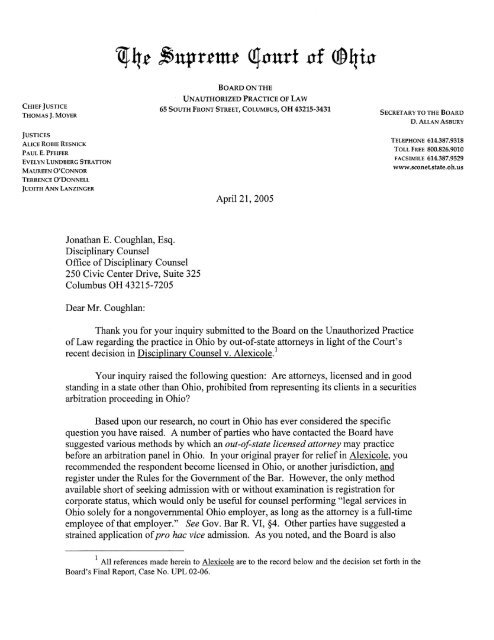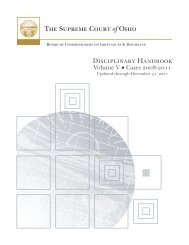Jonathan E. Coughlan, Esq. Disciplinary Counsel ... - Supreme Court
Jonathan E. Coughlan, Esq. Disciplinary Counsel ... - Supreme Court
Jonathan E. Coughlan, Esq. Disciplinary Counsel ... - Supreme Court
Create successful ePaper yourself
Turn your PDF publications into a flip-book with our unique Google optimized e-Paper software.
CHIEF JUSTICE<br />
THOMAS J. MOYER<br />
JUSTICES<br />
ALICE ROBIE RESNICK<br />
PAUL E. PFEIFER<br />
EVELYN LUNDBERG STRATTON<br />
MAUREEN O'CONNOR<br />
TERRENCE O'DONNELL<br />
JUDITH ANN LANZINGER<br />
BOARD ON THE<br />
UNAUTHORIZED PRACTICE OF LAW<br />
65 SOUTH FRONT STREET, COLUMBUS, OH 43215-3431<br />
April 21, 2005<br />
SECRET ARY TO THE BOARD<br />
D. ALLAN ASBURY<br />
TELEPHONE 614.387.9318<br />
TOLL FREE 800.826.9010<br />
FACSIMILE 614.387.9529<br />
www.sconet.state.oh.us<br />
<strong>Jonathan</strong> E. <strong>Coughlan</strong>, <strong>Esq</strong>.<br />
<strong>Disciplinary</strong> <strong>Counsel</strong><br />
Office of <strong>Disciplinary</strong> <strong>Counsel</strong><br />
250 Civic Center Drive, Suite 325<br />
Columbus OH 43215-7205<br />
Dear Mr. <strong>Coughlan</strong>:<br />
Thank you for your inquiry submitted to the Board on the Unauthorized Practice<br />
of Law regarding the practice in Ohio by out-of-state attorneys in light of the <strong>Court</strong>'s<br />
recent decision in <strong>Disciplinary</strong> <strong>Counsel</strong> v. Alexicole. 1<br />
Your inquiry raised the following question: Are attorneys, licensed and in good<br />
standing in a state other than Ohio, prohibited from representing its clients in a securities<br />
arbitration proceeding in Ohio?<br />
Based upon our research, no court in Ohio has ever considered the specific<br />
question you have raised. A number of parties who have contacted the Board have<br />
suggested various methods by which an out-ol-state licensed attorney may practice<br />
before an arbitration panel in Ohio. In your original prayer for relief in Alexicole, you<br />
recommended the respondent become licensed in Ohio, or another jurisdiction, and<br />
register under the Rules for the Government of the Bar. However, the only method<br />
available short of seeking admission with or without examination is registration for<br />
corporate status, which would only be useful for counsel performing "legal services in<br />
Ohio solely for a nongovernmental Ohio employer, as long as the attorney is a full-time<br />
employee of that employer." See Gov. Bar R. VI, §4. Other parties have suggested a<br />
strained application of pro hac vice admission. As you noted, and the Board is also<br />
1 All references made herein to Alexicole are to the record below and the decision set forth in the<br />
Board's Final Report, Case No. UPL 02-06.
Apri121, 2005<br />
Page 2<br />
aware, the common law concept of pro hac vice admission is not particularly applicable<br />
to arbitration practice, unless and until an arbitration decision is appealed to a court of<br />
law.<br />
In Alexicole, the complaint and the subsequent decision of this Board were<br />
contained to a particular set of facts. Specifically, it can be discerned from the record that<br />
respondent Bandali Dahdah, a principal of Alexicole, Inc., was not licensed as an<br />
attorney in any state, district, territory or other jurisdiction of the United States when the<br />
acts complained of were committed. Despite the fact the rules of the National<br />
Association of Securities Dealers (NASD) do not require a party to be represented by an<br />
attorney, the Board found that Dahdah and Alexicole, Inc. had been engaged in the<br />
unauthorized practice of law, most notably due to the lack of a license to practice law in<br />
Ohio.<br />
Private arbitration raises a number of multijurisdictional practice issues due to its<br />
inherent procedural flexibility. Parties to an arbitration often cross state lines and agree<br />
to the selection of an alternative forum in lieu of proceeding before a state or federal<br />
court. Often the only nexus to Ohio is the choice of arbitrator, while in some cases one<br />
party is an Ohio resident represented by an Ohio attorney, while the other party is a<br />
corporation represented by corporate counsel but licensed in another state. In the latter<br />
case, the choice of venue in Ohio is merely determined by the filing of an arbitration<br />
demand by the Ohio resident.<br />
The Board is also aware of ABA Model Rule 5.5(c)(3) which would ostensibly<br />
permit an out-ol-state licensed attorney in some instances to engage in the practice of law<br />
before arbitration hearings set in Ohio. We understand Rule 5.5 is currently under<br />
consideration by the <strong>Supreme</strong> <strong>Court</strong> Task Force on the Rules of Professional Conduct. If<br />
the Rule is adopted in its entirety, it could effectively overrule an opinion by this Board<br />
contrary to the intent of the Rule. The Board also notes that Rule 5.5 follows the modern<br />
trend of multijurisidctionallaw with respect to practice before arbitration tribunals and is<br />
in conformity with decisions of other jurisdictions.<br />
In light of the pending adoption of Model Rule 5.5 in Ohio, and the record before<br />
the Board in Alexicole, we must respectfully decline to issue an advisory opinion at this<br />
time. However, the Board hopes that you will find the information gleaned from the<br />
record and a general discussion of the state of the law useful when considering the<br />
appropriateness of out-of-state attorneys engaged in arbitration related matters in Ohio.<br />
Very truly yours,
















